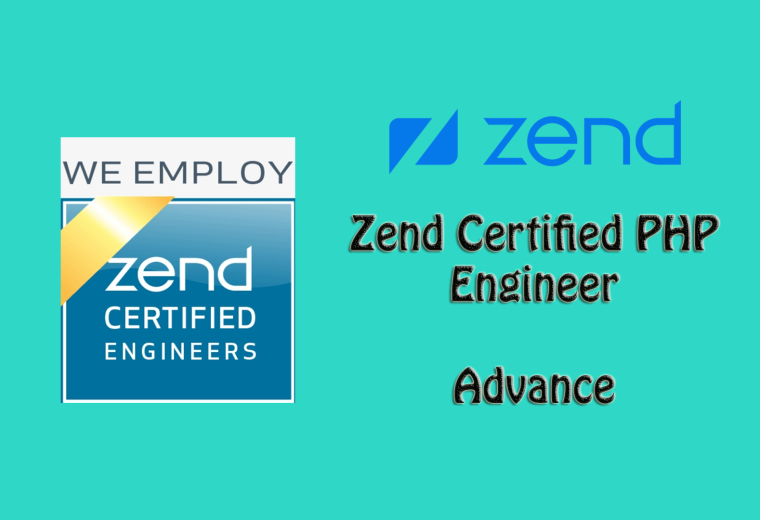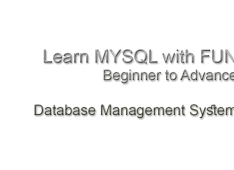This module provides the student with the knowledge and skills needed to prepare for and take the ZCE exam with confidence and achieve the best possible results. To prepare for the ZCE exam, candidates can take training courses, study resources, and practice exams, and follow best practices for exam preparation. With proper preparation and effort, candidates can achieve the ZCE certification and further their careers in PHP programming.
Here is the course outline for preparing for the Zend Certified Engineer (ZCE) certification:
- Introduction to PHP
- History of PHP
- PHP syntax
- Variables, data types, operators, and control structures
- Error handling and debugging
- Arrays and Functions
- Array operations, sorting, and searching
- Creating and using functions
- Anonymous functions and callbacks
- Object-Oriented Programming
- Classes, objects, inheritance, and interfaces
- Exception handling
- Design patterns
- Databases and Security
- Connecting to databases and querying data
- Prepared statements and transactions
- Authentication, authorization, encryption, and session management
- Web Services and PHP Extensions
- REST and SOAP web services
- Integrating with third-party APIs
- Using and creating PHP extensions, such as PDO and SPL
- Regular Expressions
- Pattern matching and string manipulation
- Regular expression functions and operations
- Best Practices and Advanced Topics
- Coding standards and debugging
- Performance optimization and scaling
- Advanced topics such as testing, deployment, and security
- Preparation for ZCE Exam
- Review of exam format and content
- Practice exams and questions
- Final exam simulation and review
Note: The course outline is just a sample and may vary depending on the instructor or training provider. It is important to check the latest information and syllabus on the Zend Technologies website for the most up-to-date exam content.
Introduction to PHP is a fundamental module of a course preparing for the Zend Certified Engineer (ZCE) certification. This module covers the basics of PHP, including its history, syntax, and features.
- ginnings to its current status as one of the most popular web programming languages.
- PHP Syntax: An introduction to the basic syntax of PHP, including comments, variables, data types, operators, and control structures.
- Variables and Data Types: An overview of PHP's variable system and its data types, including integers, floats, strings, and arrays.
- Operators: An introduction to PHP's arithmetic, comparison, and logical operators and their uses in programming.
- Control Structures: An overview of PHP's control structures, including if/else, switch, while, and for loops, and how they can be used to control the flow of a PHP program.
- Error Handling: An introduction to error handling in PHP, including the types of errors that can occur and how to use try/catch and exception handling to manage and debug errors in PHP.
This module provides a solid foundation for further study of PHP and web development, and prepares the student for the ZCE certification exam.
Arrays and Functions is a module in a course preparing for the Zend Certified Engineer (ZCE) certification. It covers arrays, which are used to store collections of data, and functions, which are used to organize and reuse code.
- Arrays: An overview of arrays in PHP, including their syntax, operations, and methods for sorting and searching.
- Array Operations: An introduction to common array operations, such as adding, removing, and modifying elements, as well as merging and splicing arrays.
- Sorting and Searching Arrays: An overview of different methods for sorting arrays, such as sort, rsort, and asort, and techniques for searching arrays, such as in_array and array_search.
- Functions: An introduction to functions in PHP, including how to create, call, and pass parameters to functions, as well as return values.
- Anonymous Functions and Callbacks: An overview of anonymous functions and callbacks, which are used to pass code as arguments to other functions.
This module provides the student with a strong understanding of arrays and functions in PHP and prepares the student for further study of PHP and web development, as well as the ZCE certification exam.
Object-Oriented Programming (OOP) is a module in a course preparing for the Zend Certified Engineer (ZCE) certification. This module covers the principles and concepts of object-oriented programming and how they are applied in PHP.
- Classes and Objects: An overview of classes and objects, which are the building blocks of object-oriented programming. The student will learn how to create classes, instantiate objects, and access properties and methods.
- Inheritance: An introduction to inheritance, which allows a class to inherit properties and methods from a parent class. The student will learn how to use inheritance to create more complex and flexible classes.
- Interfaces: An overview of interfaces, which are used to define a common set of methods for a group of classes. The student will learn how to use interfaces to ensure that classes implement the same methods and provide a consistent interface to the code that uses them.
- Exception Handling: An introduction to exception handling, which is used to manage errors and exceptions in PHP. The student will learn how to use try/catch and throw statements to handle exceptions and ensure that their code is robust and error-free.
- Design Patterns: An overview of common design patterns, such as the Singleton, Factory, and Observer patterns, and how they can be used to solve common programming problems and improve the design and architecture of a PHP application.
This module provides the student with a solid understanding of object-oriented programming in PHP and prepares the student for further study of PHP and web development, as well as the ZCE certification exam.
Databases and Security is a module in a course preparing for the Zend Certified Engineer (ZCE) certification. This module covers the basics of working with databases in PHP and the importance of securing PHP applications.
- Databases: An overview of databases and how they are used to store and manage data in PHP applications. The student will learn how to connect to databases, execute queries, and process results using PHP's database extensions, such as PDO and MySQLi.
- SQL: An introduction to SQL, the standard language for interacting with databases, and how to use it to create, modify, and query databases.
- Security: An overview of the importance of security in PHP applications and common security threats, such as SQL injection, cross-site scripting, and cross-site request forgery. The student will learn best practices for securing PHP applications and protecting sensitive data.
- Encryption: An introduction to encryption, a technique for transforming plain text into an unreadable form, and how to use encryption to protect sensitive data in PHP applications.
- Authentication and Authorization: An overview of authentication and authorization, the process of verifying a user's identity and granting or denying access to resources based on that identity. The student will learn how to implement authentication and authorization in PHP applications using sessions and cookies.
This module provides the student with a solid understanding of working with databases and securing PHP applications and prepares the student for further study of PHP and web development, as well as the ZCE certification exam.
Web Services and PHP Extensions is a module in a course preparing for the Zend Certified Engineer (ZCE) certification. This module covers the basics of web services and how to extend PHP with custom extensions.
- Web Services: An overview of web services, a technique for exchanging data and functionality between applications over the internet. The student will learn how to create and consume web services in PHP using REST and SOAP protocols.
- RESTful Services: An introduction to RESTful web services, which are based on the Representational State Transfer (REST) architecture style. The student will learn how to create RESTful web services in PHP and how to consume them using the cURL library.
- SOAP Services: An overview of SOAP web services, which are based on the Simple Object Access Protocol (SOAP). The student will learn how to create and consume SOAP web services in PHP using the soap extension.
- PHP Extensions: An introduction to PHP extensions, which are libraries of code that can be dynamically loaded into PHP to extend its functionality. The student will learn how to create custom PHP extensions and how to use existing extensions to solve common programming problems.
- Debugging and Optimization: An overview of debugging and optimization techniques, which are essential for creating high-quality, efficient, and reliable PHP applications. The student will learn how to use tools such as Xdebug and Zend Debugger to diagnose and resolve problems in PHP code, and how to use optimization techniques, such as caching and profiling, to improve the performance of PHP applications.
This module provides the student with a solid understanding of web services and PHP extensions and prepares the student for further study of PHP and web development, as well as the ZCE certification exam.
Regular Expressions is a module in a course preparing for the Zend Certified Engineer (ZCE) certification. This module covers the basics of regular expressions and how to use them in PHP.
- Introduction to Regular Expressions: An overview of regular expressions, a pattern-matching language used to process text. The student will learn how regular expressions can be used to search, replace, and validate text in PHP applications.
- Basic Regular Expressions: An introduction to basic regular expressions, including character classes, quantifiers, and anchors. The student will learn how to use basic regular expressions to match and replace simple patterns in text.
- Advanced Regular Expressions: An introduction to advanced regular expressions, including grouping, alternation, and lookahead assertions. The student will learn how to use advanced regular expressions to match and replace complex patterns in text.
- PHP's Regular Expression Functions: An overview of PHP's regular expression functions, including preg_match(), preg_replace(), and preg_split(). The student will learn how to use these functions to process text using regular expressions in PHP applications.
- Regular Expression Examples: A collection of real-world examples of how regular expressions can be used to solve common programming problems in PHP applications, such as validating email addresses, URL's, and phone numbers.
This module provides the student with a solid understanding of regular expressions and prepares the student for further study of PHP and web development, as well as the ZCE certification exam.
Best Practices and Advanced Topics is a module in a course preparing for the Zend Certified Engineer (ZCE) certification. This module covers best practices and advanced topics in PHP programming.
- Best Practices: An overview of best practices in PHP programming, including coding standards, error handling, and security. The student will learn how to write high-quality, maintainable, and secure PHP code.
- Design Patterns: An introduction to design patterns, which are reusable solutions to common programming problems. The student will learn about popular design patterns such as the Model-View-Controller (MVC) pattern, the Singleton pattern, and the Factory pattern and how to implement them in PHP.
- Performance Optimization: An overview of performance optimization techniques, including caching, profiling, and scaling. The student will learn how to use these techniques to improve the performance of PHP applications.
- MVC Frameworks: An introduction to MVC frameworks, which are reusable components that simplify the development of web applications. The student will learn about popular MVC frameworks such as Laravel, Symfony, and Zend Framework and how to use them to build robust and scalable PHP applications.
- Advanced Topics: An overview of advanced topics in PHP programming, including multithreading, asynchronous programming, and event-driven programming. The student will learn how to use these techniques to build scalable and responsive PHP applications.
This module provides the student with a solid understanding of best practices and advanced topics in PHP programming and prepares the student for further study of PHP and web development, as well as the ZCE certification exam.
Zend Certified Engineer (ZCE) Exam Seat Instructions:
- Scheduling: Candidates can schedule their ZCE exam through the Zend website by selecting a date, time, and location convenient for them.
- Requirements: Candidates must bring two forms of government-issued identification to the exam, one with a photo and one with a signature. No personal items are allowed in the exam room, including phones, calculators, or notes.
- Exam Format: The ZCE exam is a computer-based exam consisting of multiple-choice and true/false questions. The exam is timed and lasts for 90 minutes.
- Testing Center: The ZCE exam is administered at Pearson VUE testing centers. Candidates should arrive at the testing center at least 30 minutes before their scheduled exam time and be prepared to comply with the testing center's policies and procedures.
- Exam Results: Exam results are available immediately upon completion of the exam. Candidates who pass the exam will receive a certificate and be listed in the Zend Certified Engineers database.
- Re-examination: Candidates who do not pass the ZCE exam may retake the exam after a specified period of time has elapsed.
By following these seat instructions, candidates can ensure a smooth and successful experience when taking the ZCE exam.
In conclusion, the Zend Certified Engineer (ZCE) certification is a globally recognized certification that demonstrates a candidate's expertise in PHP programming. The ZCE certification is designed to test a candidate's knowledge and skills in areas such as PHP fundamentals, object-oriented programming, databases, security, and best practices.
By obtaining a ZCE certification, a candidate can showcase their knowledge and skills to employers and clients, and increase their marketability and earning potential. The ZCE certification is also valuable for professionals who are looking to enhance their PHP programming skills and stay up-to-date with the latest best practices in PHP development.
To prepare for the ZCE exam, candidates can take training courses, study resources, and practice exams, and follow best practices for exam preparation. With proper preparation and effort, candidates can achieve the ZCE certification and further their careers in PHP programming.








Leave a Comment